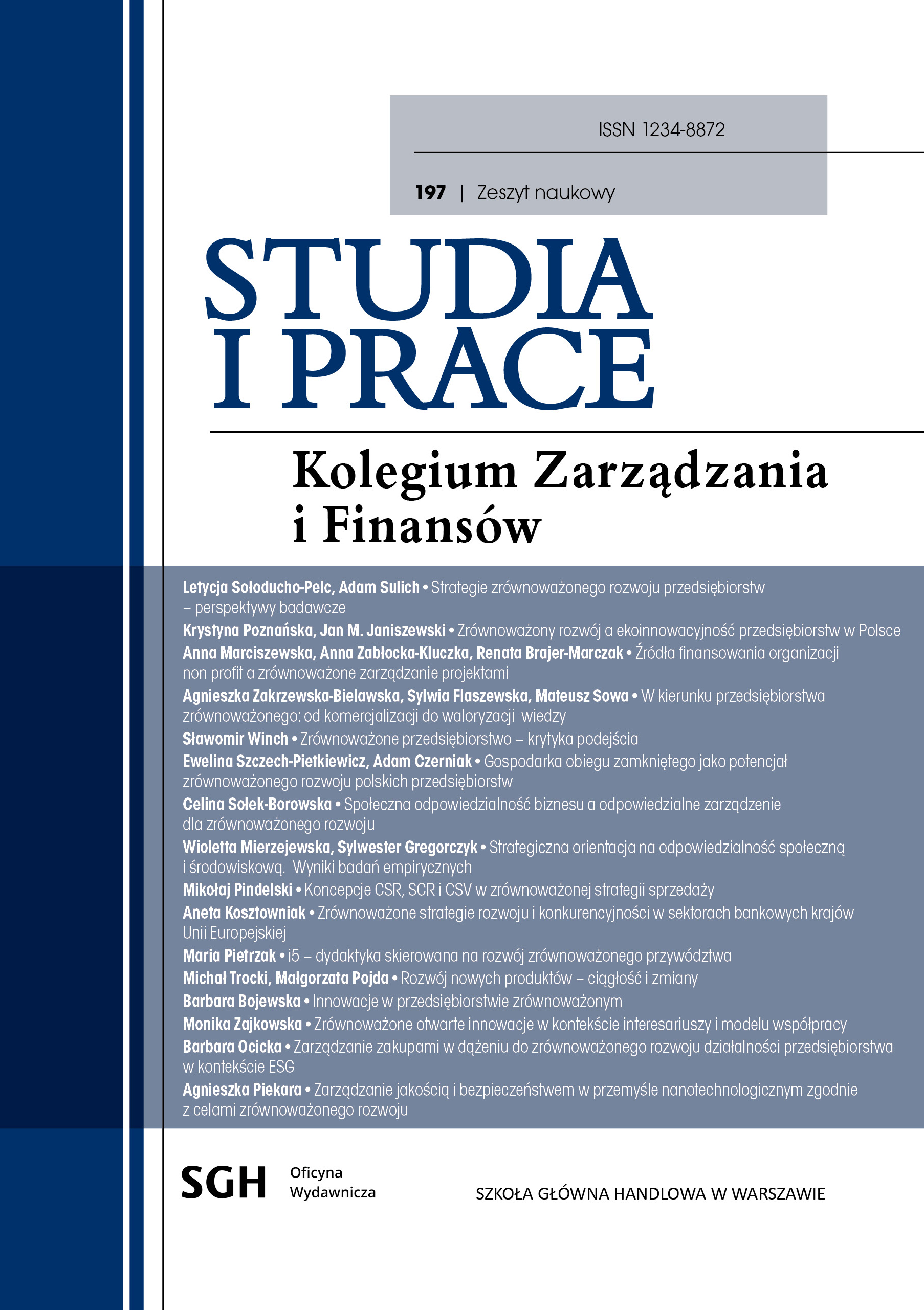Sustainable open innovation. The perspective of stakeholders and the cooperation model
DOI:
https://doi.org/10.33119/SIP.2024.197.14Keywords:
open innovation, sustainable development, innovation, stakeholders, cooperationAbstract
The study attempts to answer the question of how open innovation can effectively drive innovative activities aimed at achieving the assumed sustainable development goals. This combination of the concepts of sustainable development and open innovation has become a new domain in the classification of innovations known as Sustainable Open Innovation (ZOI). The author systematizes the concept in the current theory of innovation and identifies, based on previous research, several potential factors influencing the inclusion of sustainable development criteria in the strategies and practices of innovative enterprises. The analysis places an emphasis on the perspective of the stakeholder selection and cooperation model through the prism of open innovation. The study may contribute to a broader consideration of how open innovation can be implemented to address the individual 17 Sustainable Development Goals, thereby contributing to future research.
Downloads
References
Wydawnictwa zwarte
Chesbrough, H., Bogers, M. (2014). Explicating open innovation: Clarifying an emerging paradigm for understanding innovation. W: New Frontiers in Open Innovation, H. Chesbrough, W. Vanhaverbeke, J. West (Eds.). Oxford, UK: Oxford University Press.
Elkington, J. (2013). Enter the triple bottom line. W: The Triple Bottom Line: Does It All Add Up?, A. Henriques, J. Richardson (Eds.). Routledge.
Tammela, J., Salminen, V. (2011). Interoperability concept supporting network innovation. W: Information Technology Entrepreneurship and Innovation, IGI Global.
von Hippel, E. (2005). Democratizing Innovation. Boston, MA: MIT Press.
Artykuły naukowe
Badawy, A. M. (2004). Open innovation: the new imperative for creating and profiting from technology, Journal of Engineering and Technology Management, 21 (3).
Bogers, M., Chesbrough, H., Strand, R. (2020). Sustainabale Open Innovation to Address a Grand Challenge. Lessons from Carlsberg and the Green Fiber Bottle, British Food Journal, 122 (5).
Bogers, M., Zobel, A. K., Afuah, A., Almirall, E., Brunswicker, S., Dahlander, L., Frederiksen, L., Gawer, A., Gruber, M., Haefliger, S., Hagedoorn, J. (2017). The open innovation research landscape: established perspectives and emerging themes across different levels of analysis, Industry and Innovation, 24 (1).
Chesbrough, H., Schwartz, K. (2007). Innovating business models with co-development partnerships, Research Technology Management, 50 (1).
Chesbrough, H. (2003). The era of open innovation, MIT Sloan Management Review, April 15, 2003.
Chesbrough, H. (2012). Open innovation where we’ve been and where we’re going, Research-Technology Management, 55 (4).
Dahlander, L.,Gann, D. M. (2010). How open is innovation?, Research Policy, 39 (6).
Del Vecchio, P., Mele, G., Ndou, V., Secundo, G. (2018). Open innovation and social big data for sustainability: evidence from the tourism industry, Sustainability, 10 (9).
Enkel, E., Gassmann, O., Chesbrough, H. W. (2009). Open R&D and open innovation: Exploring the phenomenon, R&D Management, 39 (4).
Hamdouch, A., Zuindeau, B. (2010). Sustainable development, 20 years on: methodological innovations, practices and open issues, Journal of Environmental Planning and Management, 53 (4).
Harris, J. M. (2000). Basic principles of sustainable development, Working Paper No. 00–04, Global Development and Environment Institute, Tufts University, Medford/Somerville, MA.
Herzog, P., Leker, J. (2010). Open and closed innovation – different innovation cultures for different strategies, International Journal of Technology Management, 52 (3/4).
Holgersson, M., Granstrand, O. (2017). Patenting motives, technology strategies and open innovation, Management Decision, 13 (2).
Nambisan, S., Siegel, D., Kenney, M. (2018). On open innovation, platforms and entrepreneurship, Strategic Entrepreneurship Journal, 12 (3).
Oksanen, K., Hautamäki, A. (2015). Sustainable innovation: A competitive advantage for innovation ecosystems, Technology Innovation Management Review, 5 (10).
Paul, B. D. (2008). A history of the concept of sustainable development: literature review, Working Paper, Faculty of Economics, University of Oradea, Oradea.
Pezzey, J. C. V. (1997). Sustainability constraints versus ‘optimality’ versus intertemporal concern, and axioms versus data, Land Economics, 73 (4).
Saebi, T., Foss, N. J. (2015). Business models for open innovation: matching heterogeneous open innovation strategies with business model dimensions, European Management Journal, 33 (3).
Schroll, A., Mild, A. (2012). Critical review of empirical research on open innovation adoption,
Journal fuer Betriebswirtschaft, 62 (2).
Zanjirchi, S. M., Jalilian, N. (2019). Shahmohamadi Mehrjardi, M., Open innovation: fro technology exploitation to creation of superior performance, Asia Pacific Journal of Innovation and Entrepreneurship, 13 (3).
Inne
Adams, W. (2006). The future of sustainability: re-thinking environment and development in the twenty-first century, Report of the IUCN Renowned Thinkers Meeting, 29–31 January.
Brundtland, G. (1987). Report of the World Commission on Environment and Development: Our Common Future. United Nations.
Romaniuk, P., Fundacja Sendzimira Garść refleksji na temat koncepcji Potrójnej Linii Przewodniej – Forum Odpowiedzialnego Biznesu, odpowiedzialnybiznes.pl (dostęp: 20.01.2024).
ONZ (2015). Transforming our world: the 2030 agenda for sustainable development 2015. Resolution Adopted by the General Assembly on 25 September.
WCED (1987). Nasza wspólna przyszłość. Raport Brundtland, Światowa Komisja ds. Środowiska i Rozwoju. Oxford: Oxford University Press.
Downloads
Published
How to Cite
Issue
Section
License
Copyright (c) 2024 Studies and Work of the Collegium of Management and Finance

This work is licensed under a Creative Commons Attribution 4.0 International License.









